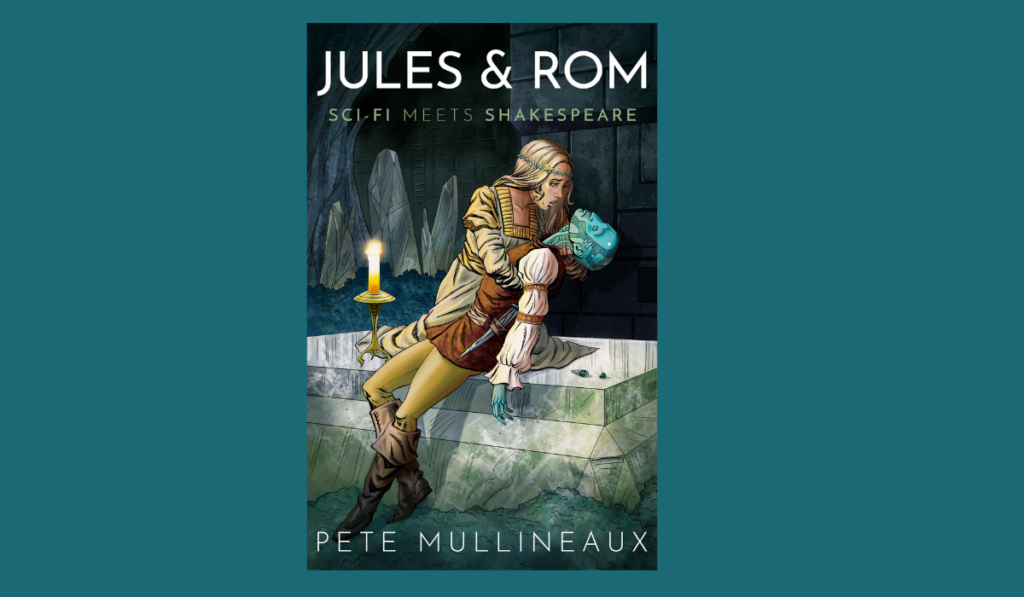
by Pete Mullineaux
Set in a US high school in 2040, Jules & Rom – Sci-fi meets Shakespeare (Troubador) follows drama teacher Kerry Tracker as she tackles staging a production of Romeo & Juliet. Rebel students have caused one of the android teachers to break down—and things move from difficult to sinister when a suspicious death takes place in the school.
Romeo and Juliet’s perennial themes of tribal conflict, love versus hate, deception versus trust, present themselves against a backdrop of updated global issues, particularly the rapid growth of AI, alongside the continuing impact of war, climate change and outbreaks of pandemic diseases.
While completing the final draft of the novel I was also working on a teaching resource commissioned by Afri (Action from Ireland) as an extension of their Global Citizenship Education Programme which is supported by Irish Aid through WorldWise Global Schools.
Interdependence Day! Teaching the Sustainable Development Goals through Drama for All Ages was launched in February this year. The title takes its cue from the words of the Dalai Lama—all things are interdependent—and offers an alternative take on the well-known sci-fi film. In this version however it’s partnership and global solidarity, along with enhanced self-awareness that save the planet.
Both books draw on global issues, with work I’ve been doing in schools over many years. They echo themes in Yuval Noah Harare’s fascinating books Homo Deus and 21 Lessons for the Future. Here he warns of dire consequences facing our species if we don’t address the challenges inherent in the development of emotional intelligence in AI. As writer and former secondary school teacher, Gerry Hanberry said after reading Jules and Rom:
“Jules and Rom creates a future that is simultaneously both familiar and scarily strange, an intriguing world where android technology and the human spirit must coexist. This original and highly entertaining story is also perhaps a little cautionary as it nods towards an unnerving place that may be lurking just up around the bend.”
Jules & Rom was also inspired by my work in Youth Theatre: alongside Shakespeare, Brecht and Greek Theatre had an impact on how the story developed. Dr Emily Cullen, speaking at the launch said: ‘One of the features I especially enjoyed was the centrality of art amid all the technology…we observe that it is the space of the theatre – not the global battlefield – that becomes the final frontier as a testing ground for android capabilities…’
Questions arose as I imagined how the children and androids putting on Romeo and Juliet might co-operate: could an android learn to act? Could they follow a script, but have the capability to improvise? Could they pick-up non-verbal subtext and be given license to wear a mask, to deceive?
Masks play a key role in the party scene in Romeo & Juliet, allowing Romeo and his friends to gain access to the home of Juliet and her parents; they also offer a metaphor for how humans often hide what is going on beneath the surface. What exactly is going on in the minds of both human and android characters becomes a prime concern in the novel: secrets and questions of trust are integral to the plot’s twists and turns, right through to the final climax and denouement.
I’ll leave the last word to Rose Smith of TwentytwoTwentyeight Magazine (USA)
‘An exceedingly interesting piece of science fiction that deftly navigates empathy and artificial intelligence in a novel way…manages to suck you into its thoughtfully crafted world. If you have been thinking about the emotional side of ourrelationship with artificial intelligence, I recommend checking this book out.’
Jules & Rom–Sci-fi meets Shakespeare|Pete Mullineaux|Troubadour|paperback|€12.00|ISBN:9781800462519











